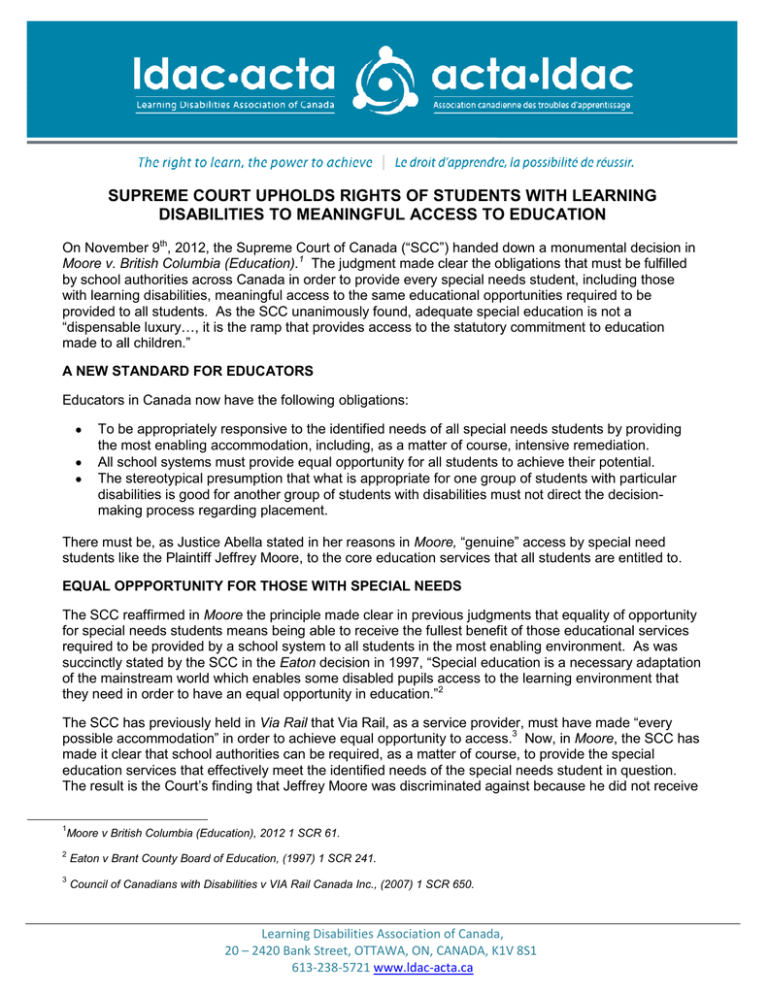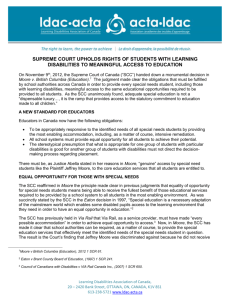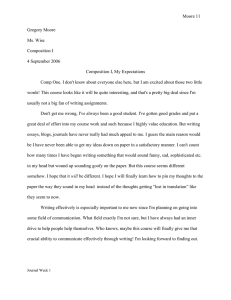supreme court upholds rights of students with learning disabilities to
advertisement

SUPREME COURT UPHOLDS RIGHTS OF STUDENTS WITH LEARNING DISABILITIES TO MEANINGFUL ACCESS TO EDUCATION On November 9th, 2012, the Supreme Court of Canada (“SCC”) handed down a monumental decision in Moore v. British Columbia (Education).1 The judgment made clear the obligations that must be fulfilled by school authorities across Canada in order to provide every special needs student, including those with learning disabilities, meaningful access to the same educational opportunities required to be provided to all students. As the SCC unanimously found, adequate special education is not a “dispensable luxury…, it is the ramp that provides access to the statutory commitment to education made to all children.” A NEW STANDARD FOR EDUCATORS Educators in Canada now have the following obligations: To be appropriately responsive to the identified needs of all special needs students by providing the most enabling accommodation, including, as a matter of course, intensive remediation. All school systems must provide equal opportunity for all students to achieve their potential. The stereotypical presumption that what is appropriate for one group of students with particular disabilities is good for another group of students with disabilities must not direct the decisionmaking process regarding placement. There must be, as Justice Abella stated in her reasons in Moore, “genuine” access by special need students like the Plaintiff Jeffrey Moore, to the core education services that all students are entitled to. EQUAL OPPPORTUNITY FOR THOSE WITH SPECIAL NEEDS The SCC reaffirmed in Moore the principle made clear in previous judgments that equality of opportunity for special needs students means being able to receive the fullest benefit of those educational services required to be provided by a school system to all students in the most enabling environment. As was succinctly stated by the SCC in the Eaton decision in 1997, “Special education is a necessary adaptation of the mainstream world which enables some disabled pupils access to the learning environment that they need in order to have an equal opportunity in education.”2 The SCC has previously held in Via Rail that Via Rail, as a service provider, must have made “every possible accommodation” in order to achieve equal opportunity to access.3 Now, in Moore, the SCC has made it clear that school authorities can be required, as a matter of course, to provide the special education services that effectively meet the identified needs of the special needs student in question. The result is the Court’s finding that Jeffrey Moore was discriminated against because he did not receive 1 Moore v British Columbia (Education), 2012 1 SCR 61. 2 Eaton v Brant County Board of Education, (1997) 1 SCR 241. 3 Council of Canadians with Disabilities v VIA Rail Canada Inc., (2007) 1 SCR 650. Learning Disabilities Association of Canada, 20 – 2420 Bank Street, OTTAWA, ON, CANADA, K1V 8S1 613-238-5721 www.ldac-acta.ca the specialized placement which had been available to students with learning disabilities, but which was denied him by the North Vancouver school district because of budget cuts. INCLUSION IS NOT THE NEW STANDARD The SCC decision in Moore does not support one placement, such as inclusion, as meeting the best interests of all special needs students; indeed the opposite is true. The SCC found that Jeffrey Moore was discriminated against, contrary to the BC Human Rights Code, by the school division denying him the sufficiently intense remediation provided by the separate specific facility to which he was entitled to achieve meaningful access to the education all other students receive. Furthermore, the Court held that there was no justification for the school division to cancel the remediation program. The Court acknowledged the financial difficulties the school division faced but found that the decision to cut the remediation program was disproportionate as compared to the other programs that were maintained. LEARNING DISABILITIES ARE ACCEPTED BY SCC AS DISABILITIES It is significant that the SCC has affirmed that Jeffrey Moore’s dyslexia was accepted without question as a disability for which he was entitled to receive remediation tailored to his specific needs. The SCC agreed with the reasons of dissenting Justice Rowles in the BC Court of Appeal ruling on Moore, who stated a student with disabilities cannot receive equal benefit from the underlying service of public education when the student is denied special education through intensive remediation. It is not an extra or ancillary service but the means by which meaningful access is achieved. EFFICIENCY DOES NOT JUSTIFY DISCRIMINATION The SCC found in Moore that “mere efficiency” cannot be used by the school division to determine what is a reasonable accommodation of a student’s specific needs. The determinative factor is what is in the overall best interest of the individual student. In order to assure that such best interests of the students are met, school divisions will have to undertake a needs-base analysis and then take such action as will be proportional to the needs, taking into account the disproportionate consequences that may befall special needs students if needs are not met. EXTENSION OF HUMAN RIGHTS PROTECTION AT THE SCC The SCC in a series of earlier judgments determined that the most enabling environment for special needs individuals must be one that: is based on correctly identified needs, is implemented by appropriately trained persons in a timely fashion with input by caregivers and, where appropriate the student, is carried out in an environment best suited to the student’s needs and provides a range of placement options, each being structured to meet the individual’s best interests. The right to a range of optimal placements in order that the best interests of a particular student are met was re-emphasized in Moore. The Court found that the separate facility had provided the intensive remediation that Jeffrey required and when closed was not replaced with an equally suitable placement. Learning Disabilities Association of Canada, 20 – 2420 Bank Street, OTTAWA, ON, CANADA, K1V 8S1 613-238-5721 www.ldac-acta.ca The Court awarded damages to the Moore family for the cost of the private school Jeffrey was placed in and awarded $10,000 damages to Jeffrey for his pain and suffering. The SCC in its decision in Moore is the latest and most important of this ascendency of decisions that make it clear that the best interests of all students with special needs, including those with learning disabilities, are met when they receive equal opportunity to services including education and that can only be assured by meaningful access. December 4, 2012 Learning Disabilities Association of Canada Legal Consortium: Yude Henteleff, C.M., Q.C., LL.D. (Hon.), Counsel, Pitblado Law, Winnipeg, Manitoba Christina Seger, Retired Lawyer, Calgary, Alberta Blair Mitchell, Partner, Mitchell & Ferguson Associates, Halifax, Nova Scotia Jane Crosbie, Associate, McInnes Cooper, St. John’s, Newfoundland and Labrador Tom Beasley, Associate Counsel, Bernard & Partners, Vancouver, British Columbia Moore v. British Columbia (Education) - 2012 SCC 61 - 2012-11-09 Appeals Learning Disabilities Association of Canada, 20 – 2420 Bank Street, OTTAWA, ON, CANADA, K1V 8S1 613-238-5721 www.ldac-acta.ca



